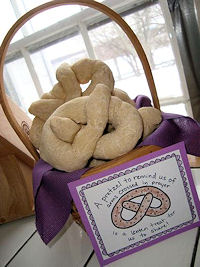
Pretzels for God: Lent and the Pretzel
Incorporating pretzels into our Lenten program is a wonderful and appropriate devotion. The pretzel being symbolic of prayer and penance is a small but powerful instrument in bringing families to God. This activity includes the history and the significance of pretzels, and a short family ceremony of the pretzel.
Please see Catholic Icing for an excellent recipe and pretzel card.
Directions
Lent is a period of fasting, self-denial and prayer, in imitation of our Lord's fasting, forty days and forty nights, and in preparation for the feast of Easter. It comprises forty days, not including Sundays, from Ash Wednesday to the end of Holy Saturday. The term "penance" should be made clear to children. It means a "change of heart," a victory over sin and a striving for holiness. The sacrifices of fasting and self-denial are only means and signs of this spiritual penance.
A traditional means of reminding the family that it is the holy season of Lent is the Lenten foods which are served only this time of the year. Thus parents and children realize, even at their meals, that prayer and penance should be practiced during these days.
The pretzel has a deep spiritual meaning for Lent. In fact, it was the ancient Christian Lenten bread as far back as the fourth century. In the old Roman Empire, the faithful kept a very strict fast all through Lent: no milk, no butter, no cheese, no eggs, no cream and no meat. They made small breads of water, flour and salt, to remind themselves that Lent was a time of prayer. They shaped these breads in the form of crossed arms for in those days they crossed their arms over the breast while praying. Therefore they called the breads "little arms" (bracellae). From this Latin word, the Germanic people later coined the term "pretzel."
Thus the pretzel is the most appropriate food symbol in Lent. It still shows the form of arms crossed in prayer, reminding us that Lent is a time of prayer. It consists only of water and flour, thus proclaiming Lent as a time of fasting. The earliest picture and description of a pretzel (from the fifth century) may be found in the manuscript-codex No. 3867, Vatican Library.
That many people eat pretzels today all through the year, that they take them together with beer in taverns and restaurants, is only an accidental habit. In many places of Europe, pretzels are served only from Ash Wednesday to Easter, thus keeping the ancient symbolism alive.
There seems to be no reason why our Christian families should not return to this beautiful custom of our ancient Roman fellow- Christian, especially since we still have these breads everywhere. The children will be delighted and greatly impressed when they hear the true story of the pretzel
From The Year of the Lord in the Christian Home by Rev. Francis X. Weiser, S.J. (Collegeville, Minnesota, The Liturgical Press, ©1964) p. 89, pp. 93-94.
Ceremony of the Pretzel
1. On Ash Wednesday, father or mother may explain the origin of the holy pretzel, so that the children will understand its significance.
2. The pretzel might be served on each plate for each evening meal until Easter.
3. Added to the grace before meals, is the following "pretzel prayer":
|
PRAYER We beg you, O Lord, to bless these breads which are to remind us that Lent is a sacred season of penance and prayer. For this very reason, the early Christians started the custom of making these breads in the form of arms crossed in prayer. Thus they kept the holy purpose of Lent alive in their hearts from day to day, and increased in their souls the love of Christ, even unto death, if necessary. Grant us, we pray, that we too, may be reminded by the daily sight of these pretzels to observe the holy season of Lent with true devotion and great spiritual fruit. We ask this through Christ our Lord. Amen. --With ecclesiastical approbation. |
Activity Source: Pretzels for God by Unknown, Pretzels for God, St. Francis Xavier Church, 4715 N. Central, Phoenix, AZ 85012